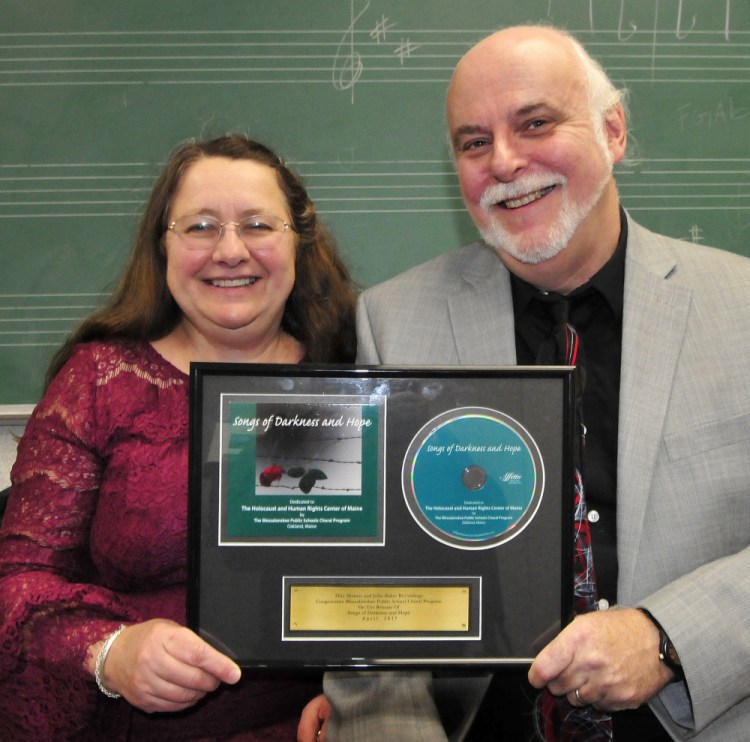OAKLAND — The chorus program in Oakland-based Regional School Unit 18 recently received a big surprise: Its recorded album, “Songs of Darkness and Hope,” had been nominated for a Grammy Award.
The central Maine students have the distinction in the choral category of being the only nominees hailing from a kindergarten-through-grade 12 school.
But for some students, the award doesn’t mean as much as the opportunity they got to take on a project with such a deep meaning. The album is about the Holocaust.
“The message (the album) promotes is more important than the recognition it’s gotten,” said Julia Cooke, a junior at the high school who is part of the chorus and the women’s chorus.
The 11-song album, recorded in April 2016 at local churches, was a collaborative project between the district’s choral music program, made up of 400 students ages 10 to 18, and the Holocaust and Human Rights Center of Maine, as well as two record companies. It includes traditional European Jewish folk music, songs that were sung in concentration camps both for marches and as a sign of rebellion, and a song from the modern musical “Ragtime,” among others.
This month, Members of the Recording Academy will reduce the field of first-round nominees for the choral category from about 20 nominations from across the country, including RSU 18, listed as Messalonskee Public Schools on the ballot. The final round of Grammy nominations will be announced officially on Nov. 28, with five nominees per category, and the 60th annual awards ceremony for the top categories will be held Jan. 28 in Madison Square Garden.
While the album covers a dark time in history, it includes messages of hope and encourages peace.
Pam and Kevin Rhein, both chorus directors at RSU 18 for the past 36 years, had wanted to do a recording project with the students for a number of years. While at the Holocaust and Human Rights Center of Maine for an event, the Rheins spoke with its executive director, Liz Helitzer, about collaborating on a project that would incorporate the cultural and musical history of the event into a recording.
They found that the center was looking for a way to engage more young people and raise awareness about the Holocaust, which began in 1933.
“As more time builds between now and then, it’s easier to feel more and more removed from it,” Helitzer said.
What originally was going to be a small program turned into multiple schoolwide events and an album recording, along with a presentation at the Holocaust and Human Rights Center of Maine.
Helitzer came to the schools multiple times to give presentations about the Holocaust to provide context for the songs, she said. She spoke about the steps that led to the genocide and parallels that exist in the world today, which is why it’s important to continue raising awareness for future generations.
“Genocide didn’t stop after the Holocaust,” she said. “Discrimination based on religion or ethnicity or sexuality or gender – that didn’t stop.”
Recording an album with 400 students was an exciting feat in itself, and no one expected the album to become nationally distributed and then nominated for a Grammy Award.
The school had won a $1,200 grant for the project, Pam Rhein said, and choral groups were raising money at concerts for the recording. John Baker, a recording engineer who runs Affecto Records in New Jersey, agreed to travel to the school to record the album.
When Baker heard about the project, he was “so overwhelmed with the meaning behind” it, Kevin Rhein said, that his company took over the remaining expenses and produced a polished album. Each student received a copy, and the center in Maine received 100 copies for visitors.
The Tri-M Music Honor Society is now sending copies to each Holocaust and Human Rights Center in the country.
Baker also got Naxos Records, the largest independent classical label in the world, involved with the project as he thought it should be heard on a larger scale. Naxos distributed the music through Amazon, Spotify, and ultimately submitted it to the Recording Academy for a Grammy Award.
When the director of Naxos Records listened to the album, he said that it was important that it be heard, given the current divisive political climate, Pam Rhein said.
Taylor Doone, a 10th-grader who is in the chorus, agreed.
“It’s really needed at this time, when there’s so much hate in this nation,” Doone said. He hopes that the album is a reminder of what hate can turn into when left unchecked.
Doone said one of the reasons he joined the Messalonskee High School Concert Chorus is that the Rheins incorporate other cultures and their music into the lessons. He was in the eighth grade when he sang “Ani Ma’Amin” for the album, which is an ancient Hebrew song that was sung by concentration camp victims as they were led into the gas chambers, and it’s an experience he still remembers.
“It really opened my eyes to the fact that, even in the most oppressive moments, the human spirit can carry on,” Doone said.
Learning more about the history of the Holocaust and how the people in those situations lived through the lens of music can provide a better understanding than history or social studies classes, both Doone and Cooke said.
“I feel very fortunate to be in such an amazing chorus that tackles such difficult issues,” Cooke said.
Madeline St. Amour can be contacted at 861-9239 or at:
mstamour@centralmaine.com
Twitter: @madelinestamour;https://twitter.com/madelinestamour
Send questions/comments to the editors.



